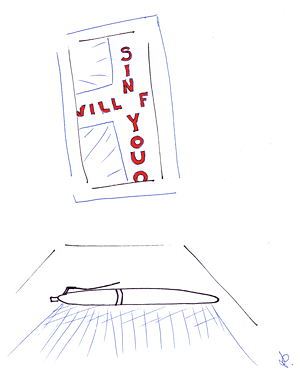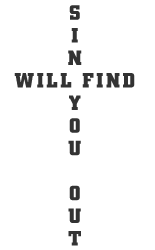|
Most of Manhattan's legal infractions occur in Times Square. I
read this in the New York Post recently. Granted, it's
a  tabloid paper, a dubious step up from the Star or the Enquirer,
but from what I've seen so far, I believe it. Not that I worry,
much. Most of the crime is petty, misdemeanors rather than felonies – muggings,
concealed weapons charges, and minor assault cases (generally after
dark). There is the occasional homicide, but it's usually among
people who already know each other. And lots of drug deals, but
to some that's a benefit rather than a drawback … talk to my “Rastafarian” neighbor,
who has never been to Jamaica but wears dreadlocks and can be counted
on to send potent waves of da ganja from his window to mine at
least twice a day, three on Saturdays. tabloid paper, a dubious step up from the Star or the Enquirer,
but from what I've seen so far, I believe it. Not that I worry,
much. Most of the crime is petty, misdemeanors rather than felonies – muggings,
concealed weapons charges, and minor assault cases (generally after
dark). There is the occasional homicide, but it's usually among
people who already know each other. And lots of drug deals, but
to some that's a benefit rather than a drawback … talk to my “Rastafarian” neighbor,
who has never been to Jamaica but wears dreadlocks and can be counted
on to send potent waves of da ganja from his window to mine at
least twice a day, three on Saturdays.
I live a few blocks from this crime
epicenter, in Hell's Kitchen (“Clinton” to those with a stake
in its gentrification). It's a New
York Magazine - and Time Out- espoused “up-and-coming,” neighborhood,
the next East Village, the next-to-next-to-next-to-last vestige
of true, gritty Manhattan reality, primed for yuppies to pillage
and trendify before they move on to the Boroughs. I live, with
a trendy yuppie roommate and my bourgeois boho self, in a walk-up
with hallways that reek of cat pee, in this neighborhood on the
fringe.
The Milford Plaza Hotel is about two blocks from our apartment.
I actually stayed there once, when I was a college senior up to
the big city for an interview with the corporate conglomerate that
would go on to ruin the first year of my life. I stayed there because
it was cheap, unaware that it was located in the middle of pre-Guiliani,
sex-central Times Square, and that I would be confined, along with
my innocence, to the inside of my room at night, hungry but unable
to leave (or even order delivery) for fear of what might happen.
Just after I moved into my neighborhood,
a woman was murdered at the Milford Plaza, which still manages
to live up to its classic slogan of being “at the center of it all,” though
perhaps not in the ways the advertisers intended. We read about
that, too, in the Post , our 2-week free trial subscription really paying
off. She was a sailor, who went back to a room with two other male
sailors, and when one attempted to have sex with her, she said
no. I imagine there was drinking involved in this scenario. I imagine
that the white uniforms were sullied as things are from leaning
against bars, from staying out until 3 in the morning. That was
when he hit her, and she, not a sailor for nothing, fought back.
By 3:30 she was lying on the street outside, ejected through the
window. They say at six stories up you cut your chances of survival
by almost 100 percent; a room on a floor below might have saved
her. Then again, maybe nothing could have. The image that sticks
with me the most is of the third sailor, neither attacker nor victim,
who'd fallen asleep in the room and remained that way through the
entire event.
I have to admit, I like it when
I tell people where I live and they gasp a little. This is especially
true when conversing with some of my parents' friends, who wouldn't
know Hell's Kitchen from Greenwich Village but are quite sure
they don't like anything that Satan may be involved with. There's
a certain rebellious pleasure to it, a “badder-than-thou” thrill
that I enjoy, particularly when I'm within the fenced-in community
of my parents' Florida neighborhood on Christmas vacation.
It is not uncommon, in my neighborhood,
for phones to ring off the hook for hours at a time, for people
to smell less than clean, for money to exchange hands and furtive
glances to be exchanged. There is an ostensible grime in my neighborhood
that seems to hover in the air, just enjoying itself – climaxing
around Times Square and gradually fading out as you head east
toward Park Avenue. Filth pervades my neighborhood in innumerable
ways. It is not uncommon for people to sin, but there are those
who seek salvation in my neighborhood, and those who profess
to give it.
Across from my apartment building
is a church, a progressive establishment with (it seems) traditional
values. It welcomes all but forgives no one, and its slogan,
which hangs in plastic letters from a cheap marquee above its
front door, is particularly foreboding. “Fear
God,” it says, “And give glory to Him.” The church is called Crossroads,
the same name of the wayward girls-and-boys home in my hometown,
and this seems appropriate; the church would appeal to those same
bad kids, if they ever did make it from Bumblefuck to Manhattan
and find themselves in a religious way.
A few blocks away, there is another
church, outside of which hangs a huge, ominous cross. Electricians
have had their heyday with this particular piece of religious
paraphernalia: red letters within the cross light up at night
causing its words glow for blocks both west and east; a high
voltage message from a higher being. “Sin
will find you out,” says the cross, and this too fits my neighborhood,
though I'm not sure of the Christian meaning it carries. Sin will
find you out, and it's all I can do not to throw up my hands and
walk straight into the nearest bar, or strip club, or off-track-betting
place, all of which are frequently and conveniently placed, in
my neighborhood.

There is a man I see frequently near the Church of Sin. He wanders
the block alone, back and forth, forth and back. Perhaps he is
waiting for Sin to find him out. He is monstrously tall, almost
seven feet. He mumbles out of the corner of his mouth, which is
twisted as if he's had a stroke, revealing a small triangle of
teeth and pink gum. I think he is a real-life giant, of the sort
you'd see on the pages of Ripleys, Believe It or Not!, a book that
I have lost interest in since becoming an adult and learning how
much there really is that's too easy to believe.
There is a piano player who lives
in the apartment below mine; rumor has it that he's been there
since the building was erected and pays a paltry $400 a month
(compared to our thousands) in rent. He is the owner of the cats,
who stink up the hallway with an acrid aroma that is particularly
bad on rainy days, stinging your eyes with a superfeline intensity.
But he plays the piano beautifully, and often I am cajoled to
sleep by the sound of his practice – soft,
tinkling notes muffled into greatness, reminiscent of Vivaldi or
Beethoven – as they travel into my room through the hollow of the
radiator.
At night, noises penetrate the
thin walls of my apartment. There are the usual creaks and aches
of the building, the noises of it “settling
in,” stretching and yawning, sticking its cold feet into fuzzy
bunny slippers - as if it had had as taxing and difficult a workday
as its occupants.
There are other noises, too, that
scare me when I am alone in my apartment at night; they are the
kind that I cannot laugh off when my roommate is out of town.
I must arm myself with a makeshift weapon (the remote control,
a pair of nail scissors, a pen – never
underestimate the power of common household objects) in order to
investigate. Too-near sirens, screeches of tires and of people,
strange whispery noises that seem to come from inside of my closed
closet door. Scratchings like those of a mouse, or worse, a rat,
from the vicinity of the kitchen, and the loud tock of the clock
that jerks me away from the edge of sleep, fearful of a break-in.
But the clop-clop sound of the hansom
carriages going by, heading home after their last ride of the night,
is a soothing one, no matter how sorry I feel for those poor, ragged
Manhattan nags with blinders on and a whip hanging over their heads.
Clop-clop, bringing back a kind of bucolic childhood that I never
knew, wind blustering at my windows as my parents read the paper
softly to one another in the next room and I drift off to sleep,
covered by a patchwork quilt stitched by my grandmother. A world
where a horse will take a sugar cube right out of a child's outstretched
palm. A world where blinders wouldn't exist. 
|
